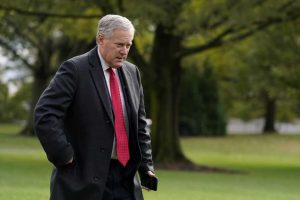Anti-Democracy PowerPoint Circulator Says He Met with Meadows, Briefed Lawmakers: Reports

Philip Waldron, a retired Army colonel who shared a PowerPoint presentation titled “Election fraud, Foreign Interference & Options for 6 JAN” detailing options for how to overturn the 2020 election, says he briefed lawmakers in Congress ahead of Jan. 6, according to reports from multiple outlets. Waldron also says he met with Mark Meadows, Trump’s chief of staff, to discuss election fraud several times, according to The Washington Post.
Waldron told the Post that he went to the White House multiple times following the election and spoke with Chief of Staff Mark Meadows on “maybe eight to 10” occasions. Meadows recently decided to stonewall the House committee investigating Jan. 6 after turning over more than a thousand documents. Included in those documents was an email referring to a PowerPoint similar to the one Waldron has circulated, although Waldron told the Post he did not send it to Meadows.
Related Stories
Trump Says His 'Fight Like Hell' Speech Before Capitol Riot Was Actually 'Extremely Calming'
Trump Ordered Staff to 'Bust Some Heads' of Black Lives Matter Protesters Outside White House: Book
Related Stories

All 206 of Taylor Swift's Songs, Ranked
50 Best Action Movies of All Time
Waldron said that he briefed some senators — including Sens. Ron Johnson (R-Wis.) and Lindsey Graham (R-S.C.) — in addition to a group of House members about his election fraud allegations using a similar PowerPoint presentation. The New York Times and The Guardian also reported that Waldron or his team briefed members of Congress on the presentation ahead of Jan. 6. The committee investigating Jan. 6 noted in a letter last week that a briefing of the presentation was to be provided “on the hill,” per the material Meadows turned over to the committee.
“The presentation was that there was significant foreign interference in the election, here’s the proof,” Waldron told the Post. “These are constitutional, legal, feasible, acceptable and suitable courses of action.”
According to multiple outlets that obtained a version of the PowerPoint similar to the ones Meadows handed to the committee, the presentation advocated having Vice President Mike Pence either reject electors from “states where fraud occurred” or replace them entirely with Republican electors who would support Trump. It also suggested declaring a “national security emergency” due to alleged “foreign influence and control of electronic voting systems” by China, which would delay the certification of Biden’s win. It further proposed declaring “electronic voting in all states invalid.” Thus far, however, no evidence of widespread or significant voter fraud to support these allegations has been brought to light, and Trump’s own Justice Department declared that there was no evidence of sufficient fraud that would have changed the electoral outcome.
Meadows, through his attorney, told The New York Times that he turned the email with the PowerPoint file over to the congressional committee because Meadows didn’t act on it, so it doesn’t fall under what Trump has tried to claim is protected by executive privilege. Meadows has used Trump’s executive privilege claim to justify his non-cooperation with the committee. He has filed suit against House Speaker Nancy Pelosi and the committee investigating Jan. 6, stating that the committee’s “demand for documents is overbroad, overreaching and far too wide-ranging to be deemed anything other than a fishing expedition.”
Although Meadows may not have taken action on the PowerPoint, he did take a number of steps to try and subvert democracy and keep Trump in power despite his election loss. Meadows pressured Justice Department officials to investigate unverified allegations of election fraud, and Jan. 6 committee Chair Bennie Thompson (D-Miss.) wrote last week that Meadows replied “I love it” to a member of Congress who shared a “highly controversial” plan to appoint alternate electors in certain states.
According to what Waldron told The Post, Meadows asked him during one meeting, “What do you need? What would help?” A Post source familiar with the matter confirmed to the paper that Waldron and Meadows met in December at the White House, but the source said Meadows had “little or nothing to do” with Waldron. Waldron said that he and Meadows mostly communicated through Trump’s personal attorney, Rudy Giuliani. Another Post source confirmed a separate November Oval Office meeting Waldron attended where Trump and some Pennsylvania lawmakers were present.
“I was just there,” Waldron told the Post of the Oval Office meeting. “He was more interested in talking to the legislators and understanding what happened in the Pennsylvania elections. … It was very informal. He had a lot of conversation with state legislators and senators and just asked them, ‘What do you think?’”
The committee investigating Jan. 6 is slated to vote next week on whether to hold Meadows in contempt of Congress for his refusal to cooperate with its investigation. Trump’s former chief strategist, Steve Bannon, has already been indicted on two counts of criminal contempt for not cooperating with the committee’s subpoenas for documents and testimony.
Source: Read Full Article
